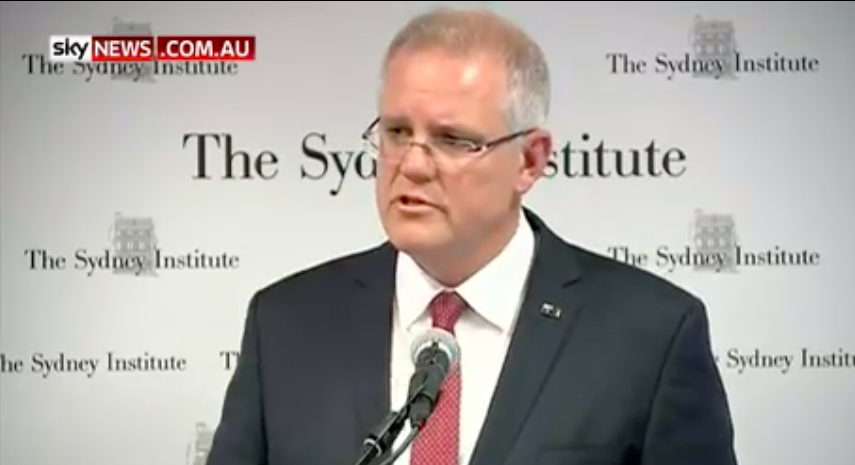MEDIA RELEASES
AIJAC welcomes Government’s acknowledgement of the reality that Jerusalem is Israel’s capital and positive steps on Iran and towards the UN
December 16, 2018 | AIJAC staff

Media Release
Following Prime Minister Scott Morrison’s address to the Sydney Institute this weekend, the Australia/Israel & Jewish Affairs Council (AIJAC) has welcomed and commended the Australian Government’s principled approach as an outcome of its reviews on Jerusalem and on Australian policies towards Iran, in light of that country’s increasingly destructive and belligerent behaviour.
Today’s announcement, that Australia would recognise west Jerusalem as Israel’s capital, while acknowledging east Jerusalem could be the capital of a future Palestinian state, shows a real commitment to progressing a two-state peace.
“While AIJAC acknowledges that the Australian embassy will not be moved to Jerusalem immediately, we strongly welcome the Australian Government’s recognition of the reality: that Jerusalem is Israel’s capital and has been since 1949,” Mark Leibler AC, AIJAC’s national chair, said. “We also welcome the government’s positive proposal to open a trade and defence office in West Jerusalem.”
“Australia has finally ended the anomaly whereby Israel is the only country in the world which does not have the right to choose its own capital on its own sovereign territory,” he said.
Leibler also commended the Prime Minister on his willingness to call out the UN General Assembly and its deplorable, biased behaviour.
“Prime Minister Morrison’s recognition of the ‘intellectual fraud’ of the UN in repeatedly condemning Israel, but failing to even once condemn Hamas’ violent terrorism, shows that Australia is prepared to take a moral stand, even if it means going against the international tide,” he said.
AIJAC’s executive director Dr Colin Rubenstein AM stated “Taking this principled decision in the right direction demonstrates the Prime Minister’s courage in standing up to bullies who have tried to intimidate him, but who do not have the interests of peace at heart.
“This decision can be seen as an important part of Australia’s long-standing bipartisan policy of seeking to promote a lasting, negotiated two-state peace between Israel and the Palestinians.
“To use the Prime Minister’s words, the peace process has reached a ‘rancid stalemate’. Australia’s Jerusalem announcement is an important part of international efforts to demonstrate to the Palestinian leadership that its refusal to negotiate in the expectation that the international community will accept Palestinian demands without the need for compromise will not succeed,” Rubenstein continued.
AIJAC also acknowledged the Government’s serious consideration on a revised policy toward Iran to address the disturbing realities that have become apparent since the implementation of the 2015 Joint Comprehensive Plan of Action (JCPOA) nuclear deal.
“It is essential that the world – Australia included – does more to contain the threat posed by an increasingly belligerent, expansionist and irresponsible Iran, the world’s most foremost state sponsor of terrorism,” Jeremy Jones AM, AIJAC’s Director of International and Community Affairs, said.
“Sadly, in the years since the signing of JCPOA, it has become clear that instead of moderating Iran, the agreement actually appears to have had the opposite effect, empowering Iran to increase its destablisation efforts and promotion of violence across the Middle East.”
Dr Rubenstein added: “AIJAC believes the JCPOA continues to be inadequate. Beyond the questions concerning the inspection and verification mechanisms and its narrow scope that the Prime Minister mentions, even its supporters now admit this agreement merely delays Iran’s goal of acquiring nuclear weapons, thanks to sunset provisions that expire in 10 to 15 years. Yet we welcome the Prime Minister’s pledge to seek ‘to tighten the net’ against Iran’s destabilising activities in the Middle East, proliferation of ballistic missiles and technology, and its support for terrorist groups.”
“Joining international efforts to pressure Iran to curb its increasingly dangerous behaviour, as the Government has done, is both principled and firmly in Australia’s national interest,” he added.
“A stable Middle East serves Australia’s national interests by helping prevent the spread of terrorism, the proliferation of weapons and protecting the security of important trade routes.
“It has become very clear that bolder and more comprehensive policies have become urgently needed to address Iran’s growing efforts to destabilise its neighbours and the region in a way which put all these interests in jeopardy,” he concluded.
For additional information, contact AIJAC on (03)-9681-6660 (business hours) or Jeremy Jones on 0411-536-436.





